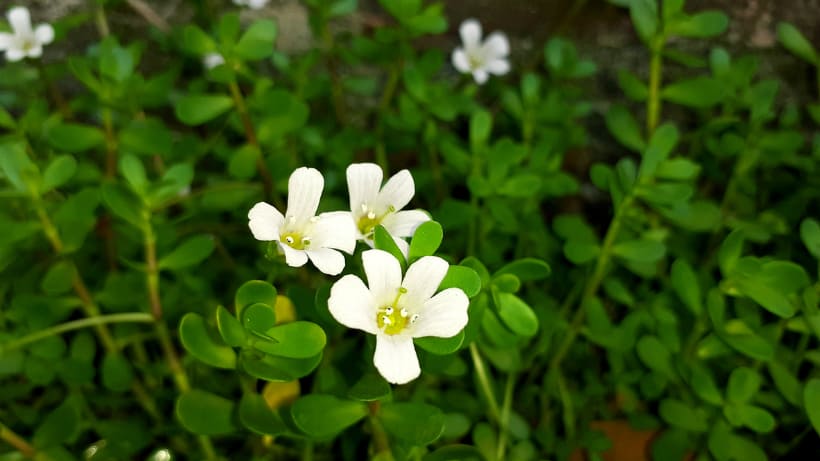
Brahmi is the primary Ayurvedic herb associated with the elevation of consciousness. There are ancient stories of monks in Northern India and Tibet eating brahmi leaves to aid in deep and prolonged periods of meditation, helping them reach new heights of awareness and clarity.
Brahmi has also been touted as the wonder herb for improving memory, sharpening the intellect, and warding off cognitive disorders and diseases such as dementia and Alzheimer’s. It’s naturally cooling quality and association with the brain makes brahmi an ideal herb to pacify mental and emotional aggravation of all three doshas, with particular benefit to fiery pitta.
It is easy, when looking for herbal medicine, to become focused on the material body and forget about the health of the brain and the subtle workings of the mind. While brahmi has many medicinal properties for the body, it’s main power lies in the support of mental health.
What is Brahmi?
There are actually two different medicinal herbs that are known as “brahmi” within Ayurveda. In Northern India, Centella Asiatica is commonly known as brahmi, while in Southern India, “brahmi” refers to Bacopa Monnieri.
In the West, Centella Asiatica is often called by its Singhalese name: Gotu Kola. While these two “brahmis” are generally very similar in quality and usage, they are distinct herbs and therefore have some minor differences that are worth understanding so you can choose the correct one for your specific needs.
Most Ayurvedic vaidyas consider Bacopa Monnieri as the authentic brahmi. For the purpose of clarity, I will distinguish the two brahmi’s by referring to Centella Asiatica as Gotu Kola and Bacopa Monnieri as brahmi. This article is in reference to Bacopa Monnieri (brahmi).
Brahmi is most commonly known as a rejuvenative for the mind and nervous system. Its name stems from connection to the god Brahma, who is associated with great intellect and creative potential. Brahmi is a sattvic herb, meaning that it promotes subtle awareness and the pure essence of consciousness. It cools and calms the mind, combating stress and anxiety, promoting healthier sleep, and boosting concentration and intellectual capacity.
Health Benefits
- Balances the emotions, helping to become more level headed and calm
- Strengthen the memory
- Boosts the intellect and ability to learn and process new information
- Promotes clarity and boosts focus and concentration
- Relieves anxiety and depression by boosting serotonin production
- Reduces stress hormones and lowers cortisol levels
- Protects against the neural oxidative stress associated with Alzheimer’s
- Bolsters the circadian rhythm, increasing energy in the daytime and promoting better sleep at night
- Strengthens the immune system and improves energy levels
- Supports healthy blood cells
- Enhances skin and hair health, reducing skin and scalp aggravation and increasing hair growth
- Promotes the proper healing of wounds and reduces scarring
- Tridoshic, meaning that it is pacifying to all three doshas. However, excess can cause an increase in vata
- Supports free movement of the joints and reduces muscular tension
- Has antioxidant and neuroprotective action
- Supports the circulatory, nervous, and digestive systems
- Supports the lymph, blood, and nervous tissues
- Resonates with all of the tissues in the body as well as the passages of elimination, particularly the urinary tract
- Promotes longevity
When to Take Brahmi
If you are susceptible to anxiety or experience high levels of stress that may affect your ability to think clearly, sleep deeply, or maintain peace of mind, then brahmi may be an excellent herb to soothe your mind and nervous system. Brahmi is also an excellent supplement for those with intellectually demanding jobs or lifestyles.
While brahmi and gotu kola have similar properties, bacopa brahmi is less cooling than gotu kola, so gotu kola is perhaps a better choice for those with high vata or kapha constitutions.
Internal brahmi supplements can be taken once or twice daily, or as recommended by your practitioner.
How to Use It
Brahmi oil can be applied to the body externally to promote skin health, supple joints and healing from any wounds or scar tissue. Massaging brahmi oil into the scalp at night is particularly cooling and relaxing, supporting healthy hair growth and promoting deeper sleep.
Brahmi can also be found in a paste form. This can be used externally in the same manner as the brahmi oil.
Brahmi can also be taken internally either in tablet form, liquid extract, or as a powder to be infused into a carrier (anupan) and consumed. Carriers for brahmi powder include water, milk and ghee. The appropriate anupan will depend upon your needs. For example, ghee is very soothing to pitta and vata and can help direct the herb to the brain and nervous system, while milk enhances the tonifying and cooling properties of brahmi.
Contraindications
Brahmi can be aggravating for vata if taken in excess or without additional supportive herbs or balancing carriers. Some side-effects to be aware of include dry mouth, nausea, thirst, indigestion, lethargy, or an increase in thyroid hormone levels.
As is the case with adding any new herb to your regimen, it is important to check with your doctor or practitioner if you are currently taking any medications or have specific health concerns to take into account. Brahmi should be avoided if you have an allergy to any member of the Figwort family. If you are currently taking antidepressants, sedatives, or anti-epileptic medication, brahmi should only be used with extreme caution.